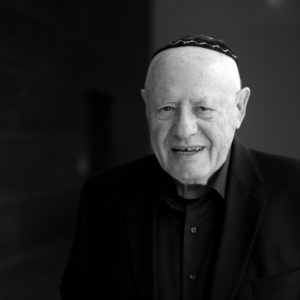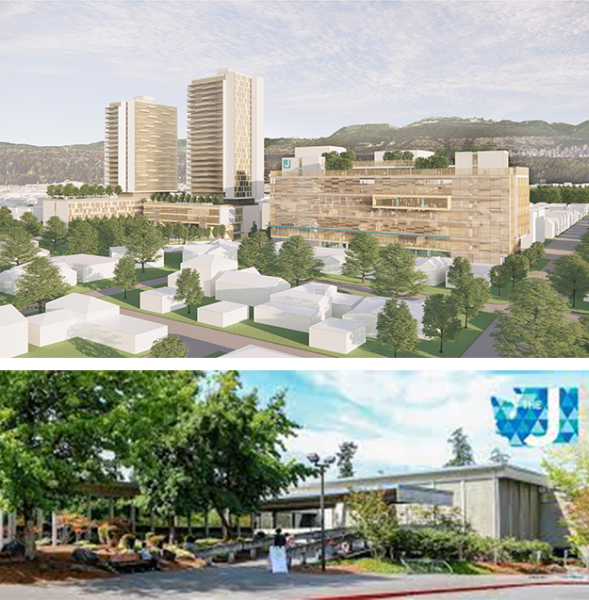By Doron Krakow
Jewish Leaders
In reflecting upon the uniqueness of Jewish Community Centers and Camps (JCCs), I often stress they are the places on the Jewish landscape that represent everyone in the communities they serve. Not every individual, to be sure, but people of every age, background, and disposition. The theory goes that if you want to know what a Jewish community looks like, sit in the JCC lobby for a few hours, and you’ll see them all—infants to seniors; secular to ultra-Orthodox; political views from left, right, and center; and every letter of the identity alphabet. They parade through the lobby enroute to classes, the gym, the gallery—wherever.
Many JCCs have a café in the lobby. The Nava Café at the JCC of Greater Vancouver, British Columbia, is home to some of the finest kosher catering in town, and it’s where I found myself Wednesday during a memorable couple of days in Canada’s westernmost Jewish community. Janos, describes it as his second home. He’s there every day, and when we began chatting, he was enjoying a bowl of vegetarian chili, which he said is prepared to perfection by the café’s owner, who takes great care to provide him with his favorites, day after day. In his youth, Janos was a professional boxer, and now in his mid-80s, he still has the attributes of a prizefighter—broad shoulders and large, meaty hands. He was born in Hungary, in Esztergom, a little town some 30 miles from Budapest. Deported by the Nazis at age 5, he survived eight months in a concentration camp in Poland, where nearly every member of his family, nearly every person he’d known, was lost to the inferno of the Holocaust. When he was old enough, he followed an uncle to America, and eventually life and work brought him to Canada’s picturesque Pacific coast, where he is a mainstay of the dwindling community of survivors. He invited me to join him for a coffee and proceeded to narrate the activity around us.

Wednesday was Yom HaAtzmaut | יום העצמאות | Israel’s 75th Independence Day, and the JCC was in full celebration mode. A seemingly endless flow of 2-, 3-, and 4-year-olds and their teachers, all decked out in blue and white, paraded by, singing Hebrew songs and showcasing a spirited folk dance or two. As people entered the building, a member of the staff presented them with a tiny Israeli flag—drawn or painted by members of the JCC family—and affixed it to their shirt, jacket, or lapel with a smile and a Chag sameach! | חַג שַׂמֵחַ | Happy holiday!
True to form, over the course of an hour or so, we saw them all. Students from King David High School, visitors to the Sydney and Gertrude Zack Art Gallery, pickle ballers, and those heading to the pool or Pilates. Janos excused himself when the clock approached the turn of the hour, as he had a meeting at the Vancouver Holocaust Education Centre, one floor down from the main lobby—another action-packed morning at the JCC.
As a first-time visitor, I was captivated by the JCC’s present, the here and now, but it was the future that became the focus as my visit unfolded. The Jewish community of Vancouver has embarked on a campaign of historic proportions to realize its vision for JWest, which will be home to a flagship JCC, a new and expanded Jewish high school, two residential towers, the Holocaust Centre, and dozens of Jewish organizations—a vision with a price tag of more than $200 million.
The current JCC opened its doors in 1961 and has been the hub of Jewish communal life for over 60 years. Though aging, the facility is maintained with remarkable care and presents beautifully to long-time members and first-time visitors alike. A clear pride of place is evident, but it’s bursting at the seams, and the community needs more.
Vancouver also has enjoyed increasing prosperity, a population influx, and a concomitant rise in real estate values, hence the extraordinary magnitude of the project’s budget. The JWest vision began with the JCC’s leaders, who recognized a unique opportunity to combine their assets and ambitions with others in the community to achieve something that none could accomplish alone. The JCC has long owned the property—with considerable value—on which JWest will be built. As such, its leaders saw a chance to be the catalyst for what’s become an historic campaign. They agreed to contribute the land to JWest—the project’s single most valuable contribution to date—and to subordinate their “ownership interest” to the larger potential that will come from working together with partners, colleagues, and funders, resulting in a shared pursuit of greater Jewish community and more vibrant Jewish life in Vancouver.

My trip continued in Seattle, where, at the Stroum JCC on Mercer Island, I once again experienced a JCC teeming with life and activity, another facility bursting at the seams—and another JCC increasingly serving as a lead engine for the entire Jewish community.
Time and again, I am moved and inspired by leaders who understand the remarkable moment in which they find themselves. At the helm of JCCs that already stand as the region’s largest and most expansive platform for Jewish engagement and grassroots Jewish community relations, they are increasingly conscious of their responsibility to be more than just the leaders of Jewish institutions. They are poised to become leaders of the Jewish community. Over the course of a few short days in the magnificent Northwest, it quickly became apparent that Vancouver JCC Executive Director Eldad Goldfarb and Board President Alvin Wasserman and Amy Lavin, Stroum JCC’s CEO, and Mindy Geissner, its board president, are already there.
Shabbat shalom | שַׁבָּת שָׁלוֹם

Doron Krakow
President and CEO
JCC Association of North America

Chag Atzmaut Sameach! Happy Israeli Independence Day!
This week’s celebration marked the anniversary of Israel’s founding according to the Hebrew calendar. On the Gregorian calendar, the one used most widely across the world, Israel declared its independence on May 14, 1948. Consistent with our approach during the last several months, this weekly “Israel at 75” segment will continue to use Gregorian dates as our point of reference.
Seventy-five years ago this week, the pre-state paramilitary organizations, which would join to become the Israel Defense Force (IDF) following the establishment of the state, fought pitched battles in Haifa, Safed, and Jaffa, securing strategic control over areas that would prove crucial to the outcome of the Independence War.
Back here in North America, Benjamin Rabinowitz—who headed the Jewish Welfare Board’s Jewish Center Division and authored “The Young Men’s Hebrew Associations (1854-1913),” published in 1947, the earliest known history of our movement—passed away unexpectedly at the age of 52 during a visit to the Montreal YMHA.
And that’s the way it was…
Reader Interactions